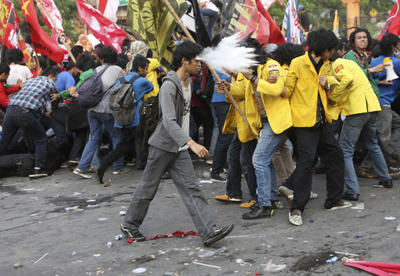Inflation has been quite steady for the last six months at close to 7 per cent per annum, which is a little above the target range. This is a disappointing outcome rather than a major problem, and reflects the central bank’s reluctance to allow the rupiah to appreciate. In response to surging food prices the government has temporarily removed tariffs on rice, wheat and soybeans, and ordered increased rice imports.
A severe fiscal problem has been apparent over the last several years — not in the usual form of unsustainable deficits, but as a consequence of enormous subsidies to the consumption of energy, both fuel and electricity. These ongoing subsidies do not threaten macroeconomic stability but, rather, encourage the wasteful use of energy, frittering away a large proportion of the value of Indonesia’s abundant hydrocarbon resources — oil, gas and coal. The main beneficiaries are the relatively wealthy classes, since they consume much more energy than the poor. Although the government is aware of the problem, its frequently professed intention to reduce the subsidies has been repeatedly postponed. Thus the 2011 national budget devotes about AU$15 billion to energy subsidies instead of using these funds to create new infrastructure and to provide better and more extensive education and health services.
The composition of exports has altered quite dramatically over the last two decades, albeit in unanticipated directions. The high hopes that had earlier been held for labour-intensive exports such as textiles, clothing and footwear have not come to fruition. Rather, the expansion of exports has been dominated by coal and palm oil. The country shares of exports have also undergone significant change, reflecting the growing relative importance of Asia to the global economy. Exports to countries such as Malaysia, India and China have been expanding rapidly, while Indonesia’s older export markets — the US, Japan and Europe — are being steadily pushed to the background.
Indonesia’s banking system virtually collapsed in the late 1990s during the Asian financial crisis, at enormous cost to taxpayers. By contrast, it came through the global financial crisis almost unscathed, except for the failure of a single, relatively small bank. This episode, which cost the government about AU$700 million, reminded policymakers of a forgotten decision of about 11 years ago to establish a single authority to supervise the entire financial sector. There were extensive discussions of a draft law along these lines in 2010, but as yet it has not been possible to resolve certain issues. This is fortunate, because the draft law, if enacted, would in fact result in a wasteful and confusing duplication of the role of bank supervision in the planned new authority. In any case, there is little to suggest any clear understanding on the part of policymakers as to exactly what establishing the new authority is supposed to achieve.
The current dynamism of the Indonesian economy would appear to spring mainly from the private, rather than the public, sector. There are frequent complaints about the government’s continuing failure to invest adequately in infrastructure, while proper management of existing public sector infrastructure has been largely overlooked. The president’s proposal for a new capital city as a solution to the horrendous shortcomings of Jakarta is unhelpful, because it avoids the fundamental question as to why Jakarta and other large cities perform their many and diverse functions so poorly. Well functioning cities are crucial to modernisation of the economy, and are also important for poverty reduction. City governments could greatly improve their performance by adopting a strategy of financial self-reliance: requiring the users of the services they provide to pay for them, rather than relying on central government handouts to cover costs. Thus far, however, there appears to be little support for such an approach.
Notwithstanding the president’s heavy emphasis on eliminating corruption, there is little concrete evidence to suggest that much progress has been made over the last six or seven years. The general public is becoming increasingly concerned about the gap between policy rhetoric and action in this field. A strong contributor to this recently has been a long-running, high profile corruption saga involving a relatively junior tax official, whose activities have helped confirm the public’s worst fears about the ineffectiveness of the government’s anti-corruption campaign. This case has made it clear not only that corruption still infects the ministry of finance, but also that it remains rampant in the courts, the police, the prison system and the immigration office. Claims of progress in this and other fields usually are typically grossly overstated, and opinion polls suggest that they have become unconvincing to voters. Genuine progress in minimising corruption is unlikely to occur in the absence of radical change in human resource management practices, including abandonment of promotion by seniority, opening up the public sector to recruitment from outside, and much more closely aligning public sector levels of remuneration with the private sector.
Ross McLeod is associate professor and editor of the Bulletin of Indonesian Economic Studies in the Crawford School of Economics and Government in the College of Asia and the Pacific at the Australian National University.
This note draws on the author’s ‘Survey of Recent Developments’, in the April 2011 issue of the Bulletin of Indonesian Economic Studies.

